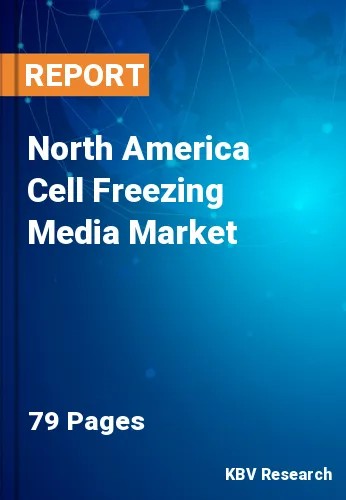The North America Cell Freezing Media Market would witness market growth of 9.0% CAGR during the forecast period (2023-2030).
Expanding the selection of cell freezing media has been significantly aided by the market trend toward using biopharmaceuticals for disease therapy. These media have been widely adopted by end users due to their adaptability, readiness for use, and affordability when compared to conventional freezing procedures. When using liquid nitrogen, the traditional freezing processes call for careful handling. The possibility of cross-contamination, the high operating costs, and the danger of suffocation from air oxygen displacement are other drawbacks of nitrogen use. As a result, over the past few years, there has been an upsurge in the acceptance of ready-to-use cell freezing media.
Without cryopreservation, cells, and tissues must be maintained in continuous culture, which requires growing and dividing them to produce additional cells (a process known as passaging). However, as cells expand throughout time, they alter and may lose crucial traits. It lessens the variability that would otherwise be generated by continuously passaging them by freezing them. An enormous variety of cells and tissues that can be used for scientific research and medical procedures, such as artificial insemination, hepatocyte & pancreatic islet transplantation, bone marrow transplantation, blood transfusion, and in vitro fertilization, can be banked with the help of cell freezing media.
The healthcare system in North America is well-developed. For the cell-based treatment demand, companies are investing in developing innovative technologies for cell freezing media. Chronic diseases like cardiovascular diseases and diabetes are on the rise largely due to sedentary lifestyles and poor dietary practices. For these disorders, research institutions are creating efficient therapy options. The region's cell treatment industry can benefit from the development of R&D efforts by using a cell freezing medium. 37.3 million Americans, or 11.3% of the population, have diabetes, according to the Centers for Disease Control and Prevention (CDC). Of this, 28.7 million people, including 28.5 million adults, had diagnoses; 8.5 million others remained undiagnosed. Hence, the rising use of cell-based therapies in treating various ailments in the region promotes expanding the market.
The US market dominated the North America Cell Freezing Media Market by Country in 2022, and would continue to be a dominant market till 2030; thereby, achieving a market value of $68,479 Thousands by 2030. The Canada market is exhibiting a CAGR of 11.4% during (2023 - 2030). Additionally, The Mexico market would witness a CAGR of 10.4% during (2023 - 2030).
Based on Product, the market is segmented into DMSO, Glycerol, and Others. Based on Application, the market is segmented into Stem Cell lines, Cancer Cell Lines, and Others. Based on End-Use, the market is segmented into Pharmaceutical & Biotechnological Companies, Research & Academic Institutes, and Others. Based on countries, the market is segmented into U.S., Mexico, Canada, and Rest of North America.
Free Valuable Insights: The Worldwide Cell Freezing Media Market is Projected to reach USD 283.7 Million by 2030, at a CAGR of 9.7%
The market research report covers the analysis of key stake holders of the market. Key companies profiled in the report include Thermo Fisher Scientific, Inc., Merck KGaA, Sartorius AG, Bio-Techne Corporation, HiMedia Laboratories Pvt. Ltd., BPS Bioscience, Inc., BioLife Solutions, Inc., PromoCell GmbH, Capricorn Scientific GmbH, and Cell Applications, Inc.
By Product
By Application
By End-Use
By Country
Our team of dedicated experts can provide you with attractive expansion opportunities for your business.

